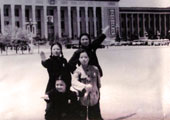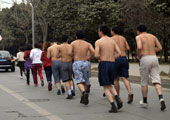
China will likely become a high-income country in 10 years, if the agricultural modernization process is able to sustain the country's economic development, a senior policy adviser said on Thursday.
"By the end of 2022, the average per capita GDP is expected to rise to $12,000, from last year's $6,000," said Zheng Xinli, vice-chairman of the China Center for International Economic Exchanges, a government think tank.
Last year, China recorded a GDP of 51.93 trillion yuan ($8.13 trillion), up 7.8 percent year-on-year. Meanwhile, the population expanded to 1.35 billion, the National Bureau of Statistics said.
The average per capita income was about $5,600 in 2011 and $4,277 in 2010, according to NBS data.
In 2008, the World Bank released new standards stating that countries should have an average per capita income above $11,906 to be part of the high-income group of countries, while $3,856 is the minimum level for upper-middle-income countries. "Agricultural modernization is the key driving force for China to escape the middle-income trap," said Zheng.
The middle-income trap - a concept first brought up by the World Bank in 2006 - refers to the economic growth challenges faced by countries at the middle-income level, usually because of unbalanced industrial structures and lack of policy innovation.
As a consequence of China's agricultural modernization process, more rural workers will be transferred into urban areas, which means that the labor force will shift from agriculture to the industrial and service sectors, Zheng said.
"This will bring a greater economic growth potential in the next decade if we take effective macroeconomic policy measures," Zheng added.
In 2012, the output of the agricultural industry was about 10 percent of the total GDP, while workers in the sector accounted for 36 percent of the national labor force, research by Zheng's think tank showed.
"The low productivity of the primary industry is the main reason for the broad income gap between rural and urban residents," he added.
The Central Committee of the Communist Party of China and the State Council, China's cabinet, released a document on Jan 31 pledging to accelerate agricultural modernization through the establishment of large family farms and measures to improve intensive production.

















 At 75, he travelled in Europe; at 98, he got a master's degree; at 102, he published an autobiography.
At 75, he travelled in Europe; at 98, he got a master's degree; at 102, he published an autobiography.


![]()
